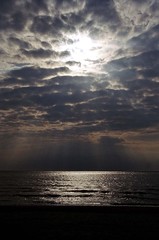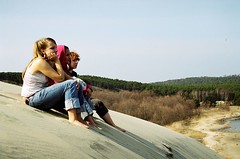26.4.05
island on the horizon
I think what I loved best was being back at the ocean (well technically sea, but same idea) again. And being with a family...I had some of the best conversations with her mom about the challenges of being a Christian in Eastern Europe-where religion often refers to ritual. We spent the weekend relaxing and walking on the beach. Sunday evening before Agata and I had to leave, we took a walk with her mother and brother along the beach. As we gazed out at the water, Karolis remarked that the way the sun shone through the clouds it looked like there was an island on the horizon. We decided it must be Heaven--so close you want to swim to it, but it could never be reached on your own.
After the walk, we watched part of a football game through the holes in the outside fence--that was hilarious, just us and a couple of old men that didnt' want to pay! Finally, Agata and I loaded the bus...back to Lithuania for finals.
composed by Jennifer Bulthuis 1 notes
15.4.05
"Need a little wind here..."
So I don't ever know who reads my blog because no one ever comments, thus I do not really post that often. So please if you do read it, drop a comment once in awhile...anything really so I know people read it and maybe even like it.
Acui labai. Jenny.
composed by Jennifer Bulthuis 8 notes
14.4.05
Snap out of reality
It was so misty (almost foggy, but different) we couldn't see where anything was. We found a little pier and walked out. Then I saw one of the most beautiful pictures ever: swans swimming out of this mist. It was incredible. Peggy made friends with them, we got some quality pictures (check out my flickr site for them) and then we went to a little restaurant for lunch. We sat on the second floor, all alone. The huge wine glasses and 3 forks at each setting told us this was a nice place. It was so cool.
By the time we were done, the mist had cleared up and it was sunny and beautiful outside. How sunny?! Well, for the first time this semester, I wore a tanktop outside and bare feet in the sand and I was hot! That's just not Lithuania, but it was awesome. We ran down some dunes, looked out the horizon and layed in the sun. I felt like I had taken a step out reality and was in a daydream...well, it was my perfect daydream.
composed by Jennifer Bulthuis 0 notes
13.4.05
The DPRK (The Democratic Peoples Republic of Korea)
Woah, talk about an eye-opening, mind-blowing experience. Today, one of our professors, Reuben, shared about his experience in
Yet they would never admit this and everywhere he went, especially the orphanages he visited, when the ambassadors offered to help, the Korean people always responded that they didn’t need help, but that they were fine. Only after much persistence would they begin to ask for medicine and food. And when given a tour, Reuben and the other ambassadors were only shown one or two classrooms, with healthy, well-dressed happy children. At one orphanage, he stole off saying he had to “go the bathroom” and was able to peek through locked doors at other rooms. In one room, he say a group of toddlers just sitting in the room, with no toys, no adults, no one. And they weren’t even playing together: just sitting. Another room, he saw a little girl through the crack in the door and waved. She smiled back and waved, then giggled. The adult in the room heard her and realized what happened and completely slapped the girl in the face.
composed by Jennifer Bulthuis 1 notes


